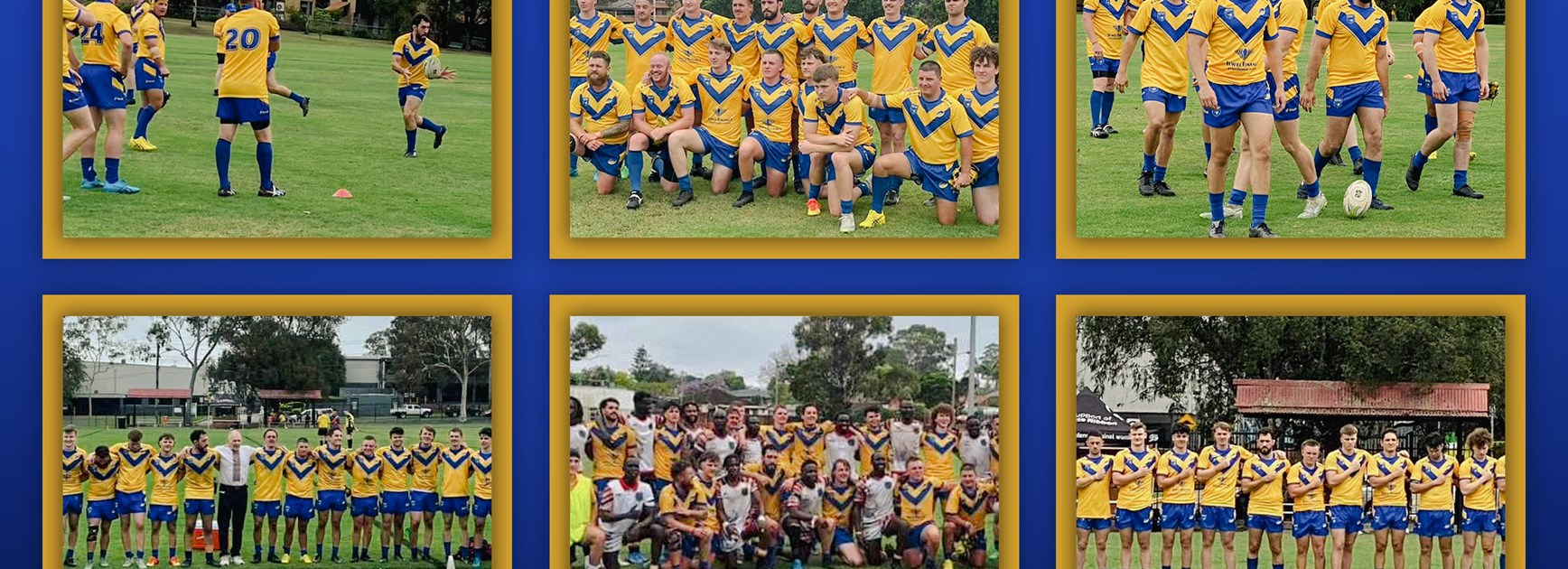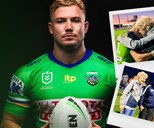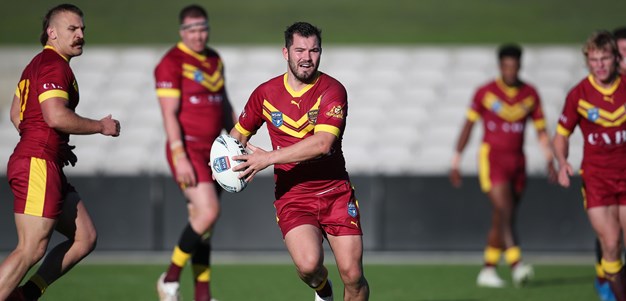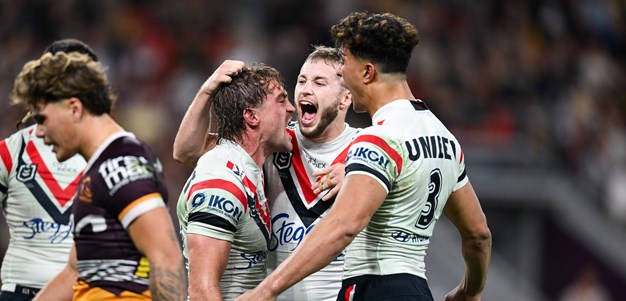
There is little that is more typically Australian than two mothers standing on a sideline on a Saturday, supporting their kids playing rugby league and chatting about family.
But on this rainy weekend afternoon in Sydney’s working-class western suburbs, what’s very different is that Kylee Jurkans and Holly Hromow are watching their young adult sons play the game with Ukraine’s national symbol on their uniforms – and, according to themselves and their supporters, Ukraine in their hearts.
For the first time in the Ukrainian diaspora’s 75-year history in Australia, the Tridents – a team of players of Ukrainian heritage created only two months earlier – competed in the Harmony Cup, a high-level official tournament staged by the NRL.
As the game against an experienced South Sudanese heritage team kicked off, Kylee, who is from Singleton some 150 kilometers north of Sydney, and Holly, from Wallaroo, 300 kilometres south of Sydney, chatted not only about their sons’ hopes of someday representing Ukraine, but also about their family ties to Ukraine and their concern for the well-being of its people.
“This experience has let the boys really discover part of our family heritage and it couldn’t come at a more intense time,” Kylee told the Kyiv Post.
“It’s very sad what is happening in Ukraine; it’s sad how their grandmother had to leave her home and her country in similar war-time circumstances in the 40s. But it’s also good there’s people coming together now.”
Holly added: “The Trident experience has helped us and Yuri connect to the community and his heritage at another level. We keep in touch with family in Ukraine [near Kharkiv] during the war and worry about them daily.
"Maybe, events like this and Yuri’s participation gives them some comfort that others have Ukraine in their hearts – even as far away as Australia.”
The Tridents were organised by Matt Gervin, who has been involved in rugby league in various capacities for his entire life.
Matt’s wife is originally from Kremenchuk, Ukraine. Watching the war with her from Australia, he decided to contribute to Ukraine’s cause using what he knew – rugby league.
Gervin reached out to Artur Martyrossian, the Kyiv-based President of Ukrainian Rugby League and a former national team player, who from the early days of Russia’s full-scale invasion has volunteered and is now a serving soldier in the Armed Forces of Ukraine.
He and Gervin agreed a plan, including a pathway for Australians of Ukrainian heritage to be eligible for national team selection.
Within weeks, Gervin and his small group of volunteers had heard from some 30 young men – from across three Australian states and a territory – who qualified on the basis of their respective family lineage.
Over eight weeks, the goal was to build a team from literally nothing and to then debut in the Harmony Cup played at the Terry Lamb Complex in Chester Hill.
In 2024 there’s a couple of big rugby league tournaments that Ukraine will play in, including a European under-19 competition, and these guys are all eligible to be selected for representative teams.
Matt Gervin Tridents organiser
Also important for Gervin and the others in the project was to give the young men better appreciation of their culture and Ukraine’s struggle for freedom, and to show solidarity with Ukraine and rugby league in Ukraine, which is fast-growing despite bombs and bullets.
Helping that effort was 72-year-old Peter Kobryn, who has been an active member of the Ukrainian community in Sydney since he arrived in Australia aged 10 and is a passionate rugby league supporter who lives in Penrith.
The power of rugby league.
The local team there, the Penrith Panthers, have won three consecutive NRL premierships and are coached by Ivan Cleary and captained by halfback Nathan Clearly.
The Cleary’s are of proud Ukrainian background and both strongly endorsed the Trident project as an act of solidarity with war-time Ukraine.
“My role was to get the team feeling comfortable with their Ukrainian heritage and getting them to bond,” Kobryn, clad in an embroidered ‘vyshyvanka’ shirt and holding the hand of his fourth generation Ukrainian-Australian grandson, said.
“They’ve really developed a strong brotherhood… We’ve talked about brotherhood, unity, strength and victory.
“They truly have Kozak blood. I’m full of pride for these boys – who are descended of a great people which has survived terrible things.”
Sixteen thousand kilometers away, another band of Kozaks is now under arms and defending their country from Russian aggression; half of Ukraine’s national representative rugby league team now serves in their country’s military.
Every day the leadership of rugby league in Ukraine hopes to avoid the tragic news that has impacted the families and friends of more than 250 Ukrainian sportsmen who have been killed in action during the full-scale war.
Close to the same age as many of their peers in the Armed Forces of Ukraine, Brock, 21, and Ryan Jurkans, 17, who regularly play for the Singleton Greyhounds, put their hands up for the Tridents.
Their Ukrainian grandmother, originally named Dania Nesterov, was forcibly taken by the Nazis as a slave labourer.
In 1948, with her Latvian husband, she migrated as a displaced person to Australia.
The Iron Curtain stopped the Jurkans’ ‘babtsya’ from ever returning to Ukraine, but she may have been proud of a little piece of Ukraine in Australia on Saturday.
“This has been really special. This a great bunch of guys who it’s been amazing to meet. We’ve learned a lot including about our heritage. We hope we made people proud. It’s been life-changing,” Brock said.
Yuri’s father, Phil, recounted travelling to Ukraine in 1996 and connecting with relatives in Kharkiv and elsewhere.
“They just ‘marked’ 10 days without missiles or shelling. Just regular people being put through all that… What a totally different reality from ours; it breaks your heart,” Phil's wife Holly said.
Brock and Yuri, who was the youngest player on the field having just turned 17, were joined by Tom Mencinsky in speaking to Kyiv Post after the match.
Having previously played rugby union, 28-year-old Tom was playing league for the first time. A third-generation Ukrainian Australian, all four of his great-grandparents were refugees during World War 2 and then migrants to Australia.
In a long-standing family tradition, he will help his grandmother, Olya, set the table this month for the traditional 12-course Ukrainian Christmas dinner.
Olya, in her late 70s, was at the match too. As the momentum shifted to the Tridents after a tough first half, she proudly offered other spectators samples of her homemade ‘varenyky’ (traditional Ukrainian potato dumplings) from a plastic container.
When the final whistle blew, the scoreline wasn’t in the Ukrainians’ favor, but it was noted that they were without some key players including Jett Cleary, the younger brother of Nathan, who was out with a shoulder injury.
But there were no losers on this day; only positive young adults, their dedicated coaches and other staff all vowing to be back for more action soon.
The Tridents were all heart.
This article was written by Pete Shmigel, Advisor to the Ambassador of Ukraine to Australia and New Zealand.



